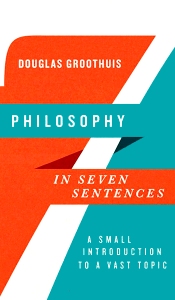 Douglas Groothuis, Philosophy in Seven Sentences: A Small Introduction to a Vast Topic (Downers Grove, IL: IVP Academic, 2016).
Douglas Groothuis, Philosophy in Seven Sentences: A Small Introduction to a Vast Topic (Downers Grove, IL: IVP Academic, 2016).
Philosophy in Seven Sentences is, as the subtitle puts it, “a small introduction to a vast topic.” Using seven sentences from famous philosophers, Douglas Groothuis (pronounced GROAT-hise) introduces readers to important questions in epistemology (the study of knowing) and metaphysics (the study of being). Here are the sentences he chooses:
- Protagoras: “Man is the measure of all things.”
- Socrates: “The unexamined life is not worth living.”
- Aristotle: “All men by nature desire to know.”
- Augustine: “You have made us for yourself, and restless is our heart until it comes to rest in you.”
- Descartes: “I think, therefore I am.”
- Pascal: “The heart has its reasons of which reason knows nothing.”
- Kierkegaard: “The greatest hazard of all, losing one’s self, can occur very quietly in the world, as if it were nothing at all.”
For each sentence, Groothuis offers a biographical sketch of the author, explains why he stated it, and offers commentary on its relevance today.
I studied philosophy in college and have read avocationally in the discipline ever since. Groothuis’s treatment reminds me why I found the study of philosophy so appealing: It forces you to work through the foundations and implications of your beliefs. In that sense, philosophy is “the art of thinking well about what matters most.”
I also grew up in a Christian home. When I announced my desire to study philosophy, my mother blanched. Every letter she sent me at college—this was the age before email—ended with a quotation of Proverbs 3:5: “Trust in the Lord with all your heart and lean not on your own understanding…” She was worried, in short, that thinking would cause me to lose my faith.
Well, I am a minister, so I guess her worst fears weren’t realized. But the sentiment is common enough, among both Christians and non-Christians. Rigorous thought and religious belief, it is assumed, are incompatible. The one must give way to the other.
But that’s simply not true. Groothuis himself is a Christian and a professor of philosophy at Denver Seminary. Four of the philosophers whose sentences he studies in this little book were Christians (Augustine, Descartes, Pascal, and Kierkegaard). Far from being the enemy of faith, good philosophy is the enemy of bad faith and unthoughtful theology. Christian parents worried about their high school graduates going off to college might want to give them this book to inoculate them against nonsense.
For the same reason, I would recommend this little introduction to pastors unfamiliar with philosophy. In an increasingly post-Christian society such as America is, pastors need to know how to navigate philosophical and worldview issues, if for no other reason than to effectively evangelize and disciple believers in a postmodern era. This book offers a relatively easy entry into topics such as relativism, the law of noncontradiction, belief in God, certainty in knowledge, and the like. Pastors seeking a more systematic treatment of arguments for Christianity (or in response to critics of Christianity) might want to pick up the author’s magisterial, Christian Apologetics.
My one complaint about this book is that it didn’t include any sentences about ethics, which is crucial to any study of philosophy. But an introduction cannot cover everything, and what this one covers is a great start.
_____
P.S. This review first appeared at InfluenceMagazine.com.
P.P.S. If you found my review helpful, please vote “Yes” on my Amazon.com review page.

